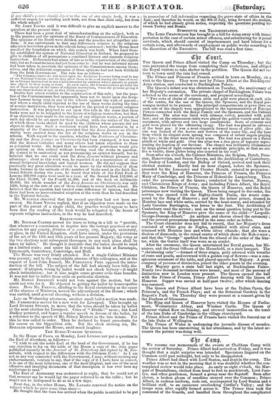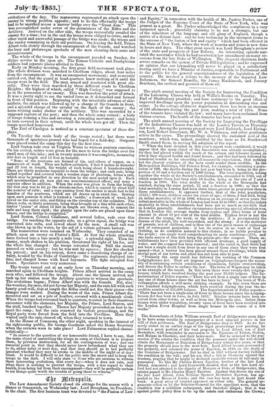Of tamp.
We resume our memoranda of the events at Chobbam Camp with the review of Saturday. Prince Albert had arrived on Friday, and it was thought that a night surprise was intended. Spectators lingered on the Common until past midnight, but only to be disappointed.
Prince Albert had dined with Lord Seaton, and slept in the camp. The weather was so wet in the morning that it was doubtful whether the con- templated review would take place. As early as eight o'clock, the Mar- quis of Breadalbane, clothed from head to foot in mackintosh, Lord Joce- lyn, and other gentlemen, formed a group near the flagstaff. Soon after eleven, a broken gleam of sunshine strayed over the Common ; Prince Albert, in undress uniform, rode out, accompanied by Lord Seaton and a brilliant staff, to an eminence overlooking Cattlin's Valley ; and the troops soon after rapidly formed across it. The Prince then took the command of the Guards, and handled them throughout the complicated evolutions of the day. The manceuvres represented an attack upon the enemy in strong position opposite ; and to do this effectually the troops had to be marched across a narrow bridge over the "Great Arm." This was accomplished under cover of the skirmishers of the Rifles and the Artillery. Arrived on the other side, the troops successfully assailed the enemy for a time; but in the end the troops were obliged to retire, and an- other rapid and successful passage of the bridge was made ; the troops and the enemy remaining in their old positions. On leaving the field, Prince Albert rode slowly through the encampment of the Guards, and watched the busy and picturesque spectacle of the men cleaning their arms and accoutrements.
The whole of the troops in the encampment paraded on Sunday, for divine service in the open air. The Roman Catholic and Presbyterian soldiers had separate places allotted to them.
Early on Monday morning, the first great field movement took place. The whole division were marched to Chobham ridges, about four miles from the encampment. It was an unexpected movement ; and so secretly carried out, that the guard at head-quarters knew nothing of it until the troops were in the field. The men armed and mustered with great ala- crity. They were then marched by three different roads to Chobham Heights ; the highest of which, called " High Curley," was supposed to be in the possession of an enemy. This was therefore the point of attack. It was a pretty sight to see the varied force as it debouched and formed in front of this position. Beginning with the invariable advance of skir- mishers, the attack was followed up by a charge of the Guards in front, and a splendid charge of the cavalry on the flank of the enemy ' • the horse retiring under shelter of the artillery. This was succeeded by a supposed capture of the post ; and then the whole army retired ; a body of troops forming a line and covering a retreating movement; and being in turn covered in their retreat, until the whole were got off. Then the troops marched homeward.
The Earl of Cardigan is noticed as a constant spectator of these dis- plays. On Tuesday the main body of the troops rested ; but there were thousands of spectators present who had hoped for a field-day. Outposts were placed round the camp this day for the first time. Lord Seaton rode over to Virginia Water to witness pontoon exercises. On his arrival, orders were given for the men to form the bridge over the small arm of this lake ; and in twenty minutes it was complete, measuring 350 feet in length and 12 feet in breadth. " Some of the pontoons are formed of tin, and others of copper, on a framework of wood. They are hollow cylinders, 2 feet 8 inches in diameter and 22 feet in length, the weight of each being about 6 hundredweight. There are thirty pontoons required to form the bridge; and each pair, being lashed together and covered with a wooden stage or platform, forms a raft, which may be propelled in any direction by the men seated upon it. Each raft accommodates six men and one noncommissioned officer, and some a superior officer in addition. When the order was given to form the bridge, the first step was to let go the stream-anchor, which is carried by about half the number of rafts ; and a rope passing from the anchor is made fast to the handles of the pontoons, which are all drawn up in exact line. Resting upon each pontoon is what is termed a 'saddle,' a framework of wood, hol- lowed on the under side, and fitting on the circular top of the cylinders. The fifteen rafts, or thirty pontoon; being thus brought in a line with each other, timber braces' of about 12 feet in length are thrown over, to cement the rafts and keep them rigid; the planks upon the rafts are placed upon these braces, and the bridge is completed." Lord Seaton, Colonel Challoner, and several ladies, rode over this bridge. Ou reaching the opposite side, on a given signal, the bridge was converted into rafts, and rowed about by the men. A small raft was also blown up in the water, by the aid of a voltaic galvanic battery. The manoeuvres were resumed on Wednesday. They consisted of an attack upon an enemy on Flutter's Hill. At first the whole attacking force formed into a line nearly a mile long : a splendid sight. Then the enemy, much shaken in his position, threatened the right of his foe, and the whole line changed : the troops retreated firing. Still the enemy pressed on with cavalry : but he was met by squares ; their fire checked his pursuit ; and on his retreat, down came a thundering charge of ca- valry, headed by the Duke of Cambridge : the regiments deployed into line, and charged home with fixed bayonets. The fight occupied four hours. Spectators were very numerous.
The troops turned out at an early hour on Thursday morning, and marched again to Chobham heights. Prince Albert arrived in the camp soon after, and followed the troops. About one the Queen arrived, and took up her station near the Artillery quarters to witness the spectacle. The evolutions began; Prince Albert was with the Guards. But, alas! the weather, for once, did not favour her Majesty, and the rain fell with such hearty good-will, that at length the Rifles could not fire their pieces—the charges were soaked. During the worst of the rain, Prince Albert dis- mounted and sat on a pile of heather, covered with a mackintosh cloak. When the troops had retreated back to quarters, worsted in their disastrous encounter with the elements, her Majesty, the Prince, Lord Seaton, and the staff, lunched together. Thence her Majesty proceeded on foot to in- spect the camp ; but the rain renewed its violent proceedings, and the Royal party were forced from the field into the Pavilion. Here they waited until the rain cleared off,when they returned to town. In the House of Commons, the other night, speaking in the interest of the sightseeing public, Sir George Goodman asked the Home Secretary when the reviews were to take place ? Lord Palmerston replied &false- teristieally— " In answer to the question of my honourable friend, I have to say, that the main object of assembling the troops in camp at Chobham is to prepare them, by previous instruction, for all the contingencies of war; and one essential point is, that they should never know beforehand what they are to do, either today or next day, and that they should go to bed perfectly ignorant whether they may be awoke in the middle of the night or at day- break. It would be difficult to let the public into the secret and to keep the troops in the dark. I will only state to those who are anxious to witness these interesting evolution; that every day—when it does not rain, and when there is nothing to prevent the troops, with a due regard to their health, from being led from their encampment—they will be perfectly certain to see things quite worth the trouble of going there to witness."



























 Previous page
Previous page